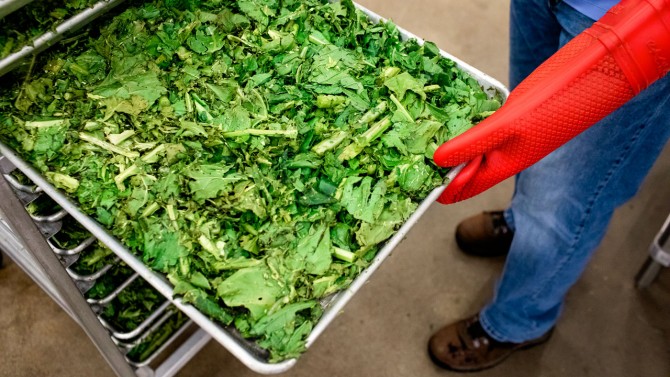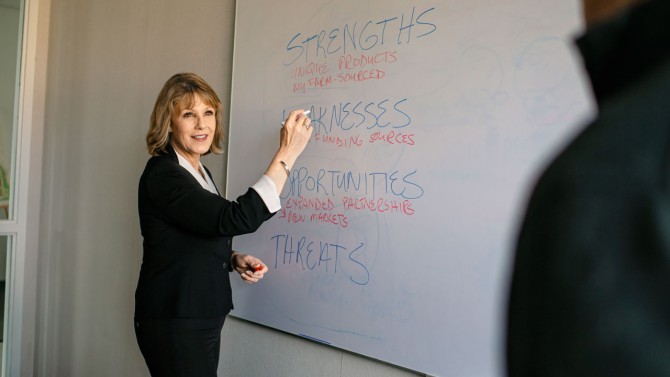When Dan Rao was laid off from his job a decade ago as a defense contractor in Rochester, New York, he had a choice: leave New York for a similar job in the Washington, D.C. area, or stay upstate and follow his entrepreneurial spirit.
An Assured Edge Solutions employee enters local produce into a machine to be dried and then made into powder at the Center of Excellence's production facility.
Immediately after the layoff, Rao worked as an independent sales consultant and, among other things, helped a consortium of farmers sell apples into new markets, including to major U.S. airports. He saw millions of apples being sorted by color and size, often with one bin of apples slated to be thrown out. Most of the discards were perfectly safe to eat, but were misshapen or too small to juice.
"Can I have them?" Rao asked the factory owners. They had no objection.
"I took them home, dehydrated them and powdered them with a coffee grinder," Rao says. "Then I put the powder in my kids' baby food, and they hammered it. They'd never eaten so well."
That was the spark of an idea that has now grown into Assured Edge Solutions (AES), a sustainable agribusiness company based in Webster, New York, Rao founded in 2011 that produces fruit and vegetable powders that are available in 10 national grocery chains, and online via Amazon and Walmart. The company also produces the Healthier Way brand of spiralized vegetable noodles available at Wegmans and five other grocery chains.
With Cornell's help, Rao made his choice: He decided to embrace entrepreneurship and stay in New York state.
AES is one of the more than 75 small New York-based companies thriving thanks to support from Cornell AgriTech's Center of Excellence for Food and Agriculture. Since its doors opened in September 2018, the Center of Excellence (COE) has connected New York state entrepreneurs with potential partners, investors, grants and Cornell's world-renowned researchers. In just the last year, companies working with the center have raised $12.3 million to grow their businesses.
From its launch in 2018 to July 2019, the 29 companies that participated in COE business development services:
- increased their total revenue by $1.4 million;
- invested $3 million in capital expenditures;
- raised $1 million in federal funds;
- raised $1.7 million in private funds; and
- created 74 new jobs.
"It's an exciting time in the food, beverage and agriculture industries; there's an incredible amount of innovation, and much of it is consumer-driven," says Cathy Young, executive director of COE. "Our purpose is to cultivate economic growth and job creation opportunities by connecting entrepreneurs to the resources they need to scale up and thrive."
The "breadbasket for the Northeast"
Before COE was created, none of New York's 13 state-designated Centers of Excellence - each associated with an institution of higher education - focused on food and ag.
That gap represented a significant opportunity to support an industry that is crucial to the economy and future of New York, says Bill Strassburg, vice president of strategic initiatives at Wegmans and a member of the advisory boards for Cornell AgriTech, multiple economic development agencies and the Cornell Tech Farm, a 72-acre business development incubator for food, agriculture and biotech startups. In 2017, New York farms created $5.7 billion in gross income, a 23% increase from the previous decade.
New York state ranks first in the nation in the production of dairy products such as yogurt and sour cream; second in apples and maple syrup; and third in wine, grapes and milk.
Cathy Young, executive director of the Center of Excellence for Food and Agriculture, performs an analysis of strengths, weaknesses, opportunities and threats for a client.
"Food and ag is a really important economic sector in New York, and especially in the Finger Lakes region - we're the breadbasket for the Northeast," Strassburg says.
To support that sector, Strassburg and Jan Nyrop, associate dean and the Goichman Family Director of Cornell AgriTech, petitioned the New York State Legislature to create the new Center of Excellence in Geneva. State legislators agreed. (A different, tech-focused COE in Canandaigua had recently closed, so the new Geneva center didn't require new tax dollars).
Of course, Cornell has been helping startup food entrepreneurs for years, through on-campus business development entities like the Cornell Food Venture Center, the Pilot Plant and the Craft Beverage Institute.
Rao, for example, sought out Cornell's help on many issues when he founded AES in 2011, including ensuring the safety and shelf-stability of his foods, and testing product development. Most helpful for Rao - who is a member of Cornell AgriTech's business advisory council and the city of Geneva's food and beverage industry consortium leadership circle - was being able to rent space at the Tech Farm to make his own product ingredients, rather than outsource many small pieces of his production; the change increased profits and reduced administrative hassle.
The Center of Excellence brings to the table a formalized group focused on developing connections between key stakeholders in the food and ag ecosystem, for the benefit of individual companies and farms, as well as the broader New York economy, Strassburg says. These stakeholders include: farmers and growers; economic development experts; Cornell researchers; small entrepreneurs; big companies such as Constellation Brands, HP Hood, and LiDestri Food and Drink; and distributors and sellers like Wegmans, which are closely connected to consumers.
"Hopefully, this Center of Excellence will help us recognize the value of what we're producing here, and also help deliver on the future success of this sector," Strassburg says. "With proper funding, emphasis and research, I think someday most of the food that's consumed on the East Coast will be grown on the East Coast."
Cornell AgriTech's Center of Excellence for Food and Agriculture has supported more than 50 New York-based companies and helped raised $12.3 million to grow businesses.
Rebuilding rural communities
The robust potential of New York's agriculture sector drew Chris LaCorata back to Chautauqua County, New York, after a 37-year career in food manufacturing, with Coca-Cola Co. and Nestlé, that took him across the country. His goal was to use that wealth of experience to start his own food-related company, one that would not only leverage upstate New York's agricultural resources but would also help ensure a more stable, prosperous future for its grain growers and rural communities.
"My wife and I lived here in the early '80s, when a lot of economic decline was happening, and that has stuck with us," LaCorata says. "We really wanted to target areas that had some significant booms and busts in the past, and build upon the untapped potential of those areas."
The Center of Excellence has been a key ally from the beginning, he says. LaCorata reached out to the Chautauqua County Industrial Development Agency and to Cornell, which brought together economic and ag experts, growers and processors to understand how best to support grain growers.
In May 2019, for example, the COE organized a Hops and Grains Summit that brought together Cornell researchers and extension specialists with trade groups and business development experts to identify the types of hops and grains that can be successfully grown on a commercial scale in western New York and the Finger Lakes.
"Cornell is going to continue to be vital to the success of this project and building the community."
Chris LaCorata, owner, Empire State Brands
The result is LaCorata's company, Empire State Brands, which LaCorata hopes will reduce the processing burden on small New York grain growers while increasing their profits. Currently, if a farmer decides to grow hops, for example, they have to figure out how to harvest, dry and bale the grain on her own. Then they'll have to transport the hops off-site to be pelletized, then take them back to the farm before selling. LaCorata has developed plans for an integrated grower, miller and processor plant that would allow a hops farmer to borrow the plant's $125,000 mobile harvester, then take the hops to the plant, which would handle the processing from there.
"All that deferred cost takes a farmer from just barely above water up to a very profitable rate," LaCorata says. "And we can vouch for the quality of our product because that's our No. 1 emphasis: making sure we introduce a quality product into New York, from New York."
Cornell will be crucial to fostering long-term relationships with farmers, he adds. "Cornell is going to continue to be vital to the success of this project and building the community," LaCorata says. "It's been a unique and wonderful experience; I've never seen this amount of effort and help from just an idea."
New York's commitment to agriculture
Centers of Excellence are a program of Empire State Development (ESD), funded through its Division of Science and Technology. Most of ESD's work involves fostering public-private partnerships early in a company's development, according to Vinnie Esposito, vice president of ESD.
"We're engaging with companies much earlier, where it's not about the state incentive, it's about having access to mentors, access to testing - the very things that Cornell has at its disposal," he says. "The Center of Excellence was an add-on to the good work Cornell was already doing; we in Empire State Development wanted to give them more resources to connect more directly with businesses."
Cathy Young, executive director of the Center of Excellence for Food and Agriculture, holds a bag of coffee produced by Cobblestone Coffee Roasters.
While the COE has a statewide impact, Esposito says upstate will especially benefit from the investment. For much of the past 30 years, the region has been in economic decline as heavy industrial manufacturing has been outsourced or automated.
"The decline of manufacturing has taken a heavy toll on our economies, but we're moving up again. I'm very bullish on upstate," Esposito says. "There's growth opportunities in the food sector that are enormous for our regions because of the expertise we have, because of the natural resources we have, because of universities like Cornell."
Krisy Gashler is a freelance writer for the College of Agriculture and Life Sciences.










